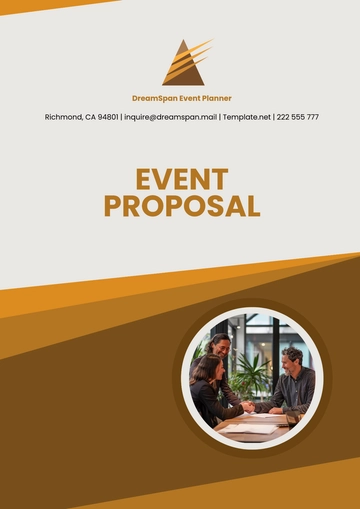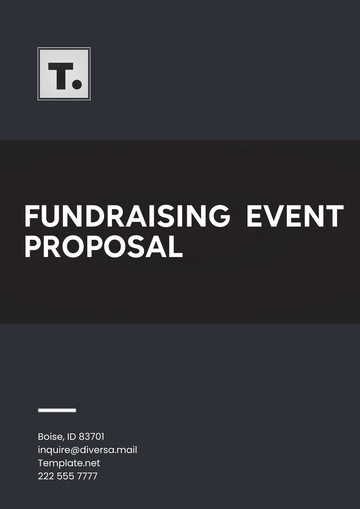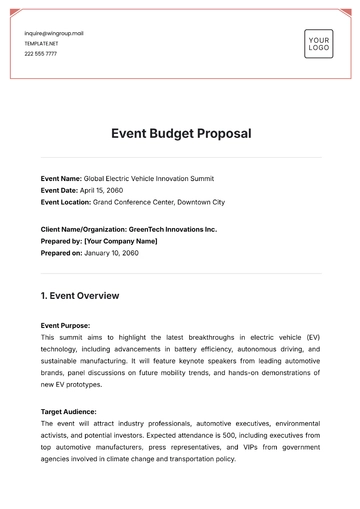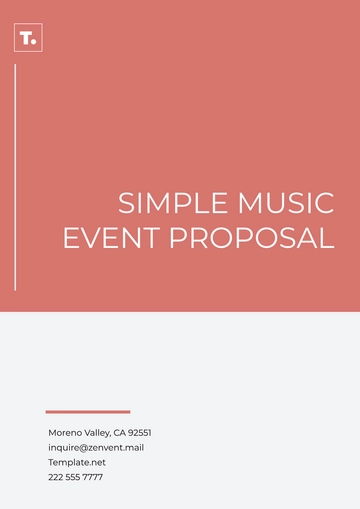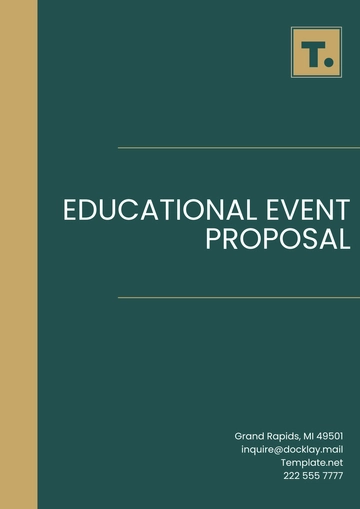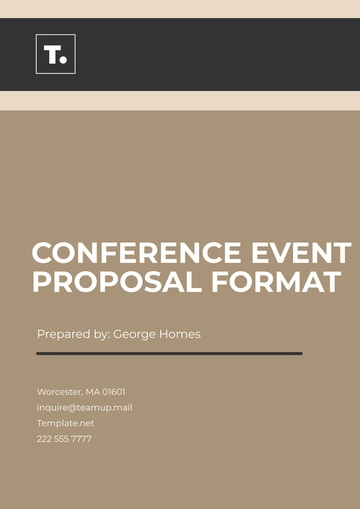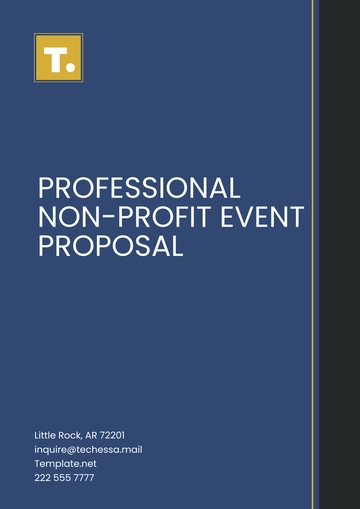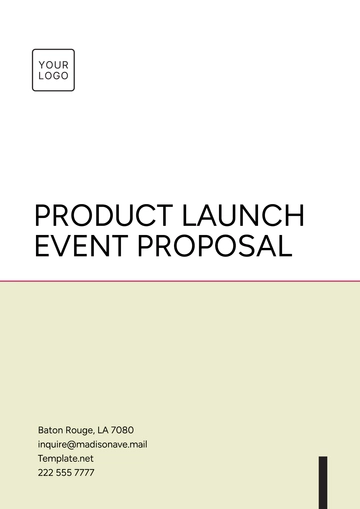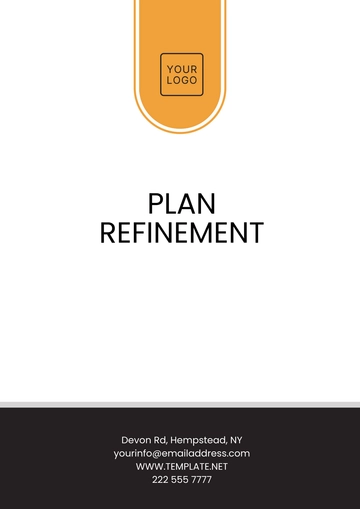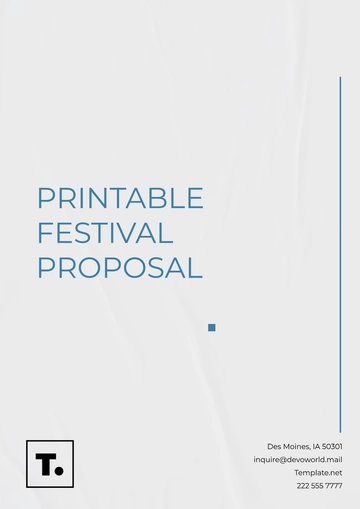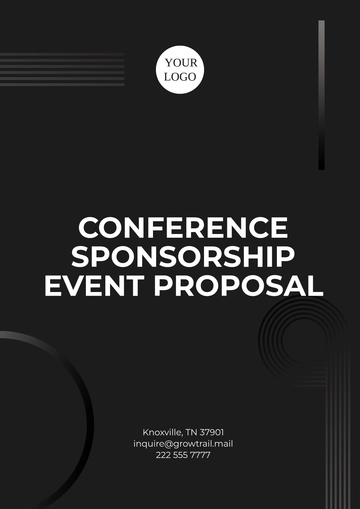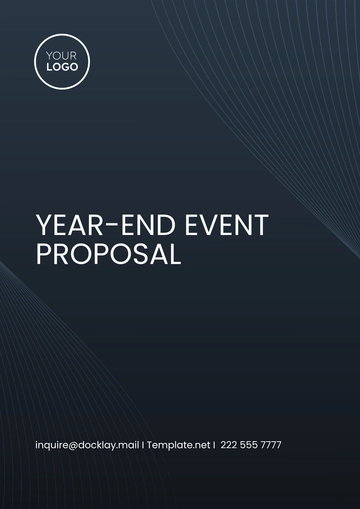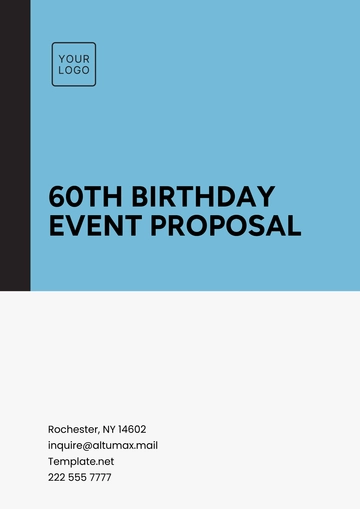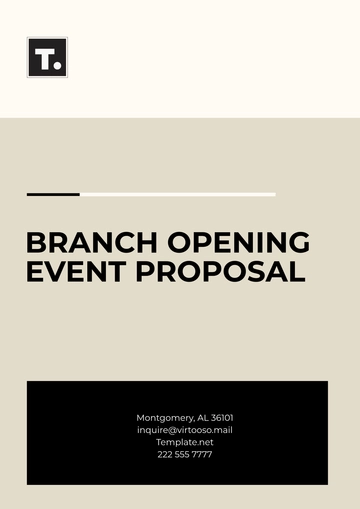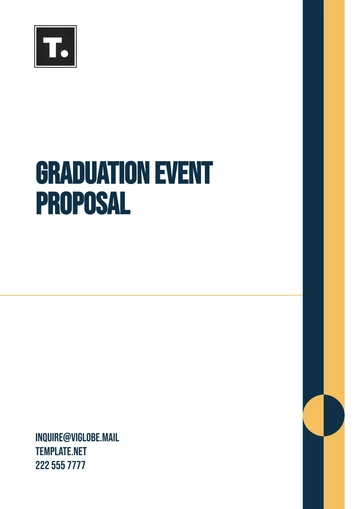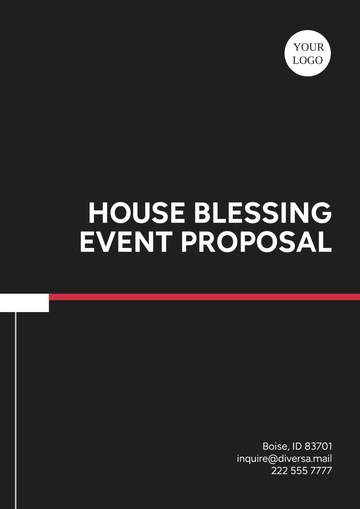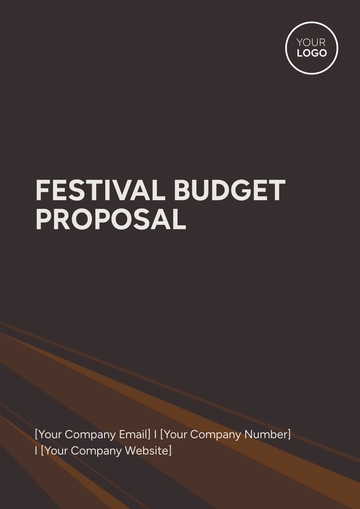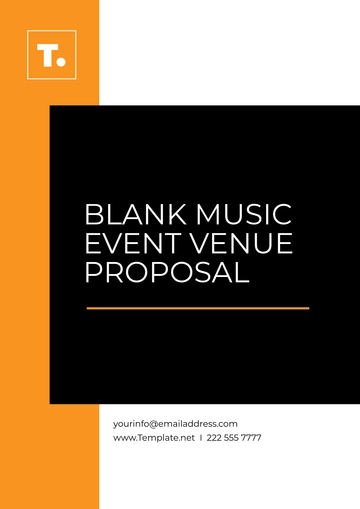Free Movie Theater Event Proposal Outline
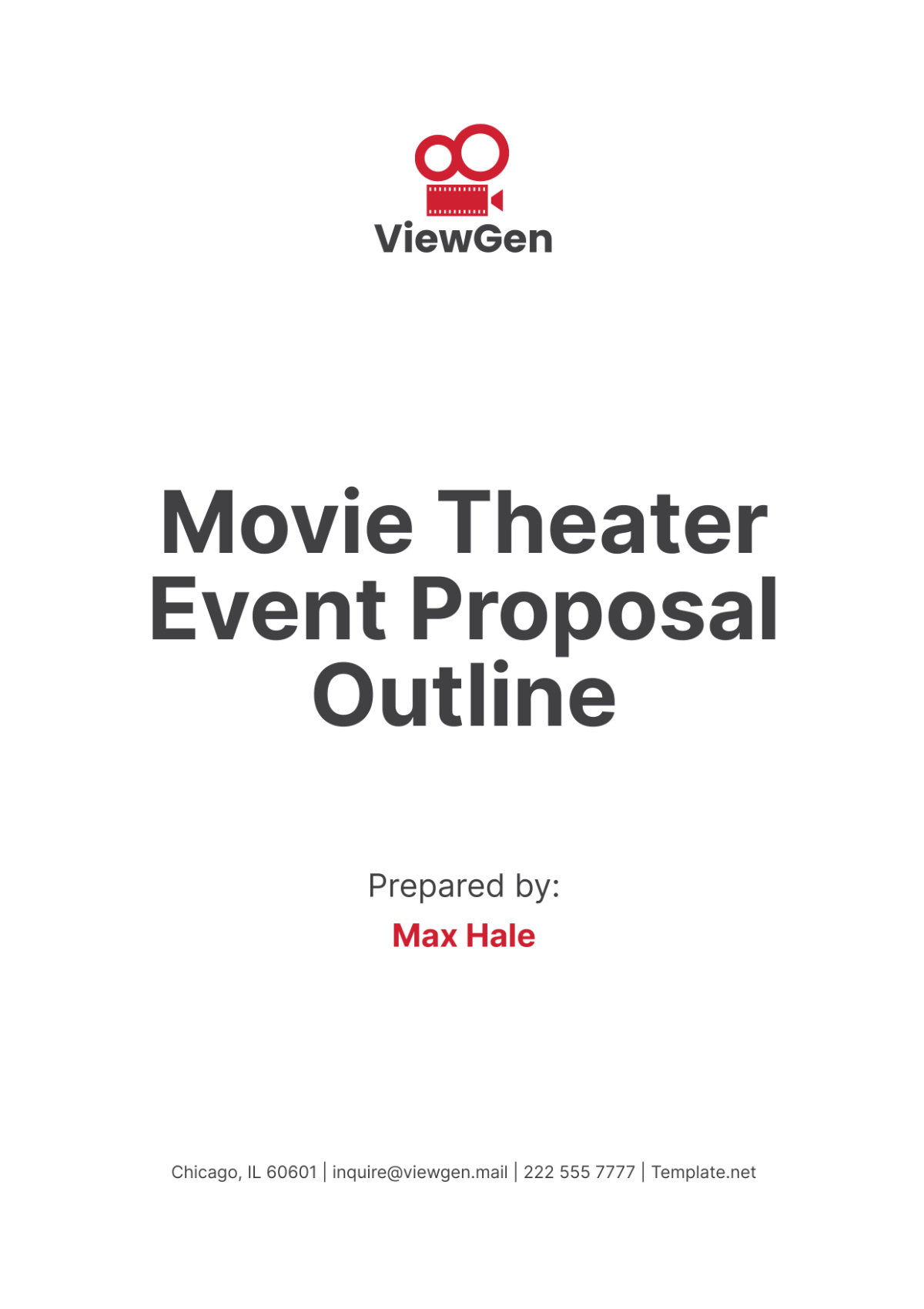
I. Introduction
A. Overview
(Describe the purpose of the proposal, providing a brief introduction to the event being planned. Include a summary of what the event is, why it is being held, and the expected outcomes. Mention the event's significance to [Your Company Name] and its target audience.)
B. Objectives
(List the main goals of the event. Explain why these objectives are important and how achieving them will benefit [Your Company Name]. Example objectives might include increasing attendance, enhancing customer loyalty, or generating additional revenue.)
C. Event Theme
(Explain the chosen theme for the event. Describe why this theme was selected, how it ties into the event's goals, and how it will appeal to the target audience. Provide details on any special activities, decorations, or features related to the theme.)
II. Event Details
A. Date and Time
(Provide the proposed date and time for the event. Explain the reasoning behind choosing this date and time, such as avoiding conflicts with other major events or considering the availability of the target audience.)
B. Location
(Describe the venue for the event, including its address and any relevant details about its facilities. Explain why this location was chosen, highlighting its advantages such as accessibility, seating capacity, and amenities.)
C. Target Audience
(Identify the primary audience for the event. Provide demographic details such as age, interests, and any other relevant characteristics. Explain why this audience was chosen and how the event will cater to their preferences and interests.)
D. Event Schedule
(Outline the schedule for the event, including start and end times for each activity. Provide a detailed timeline of all planned activities, such as movie screenings, intermissions, and special presentations. Include buffer times for unexpected delays.)
E. Movie Selection
(List the movies that will be featured during the event. Explain the criteria for selecting these movies, such as popularity, relevance to the theme, or audience preferences. Provide brief descriptions of each movie and their significance.)
F. Special Activities
(Describe any additional activities or attractions that will be part of the event, such as guest speakers, live performances, or interactive exhibits. Explain how these activities enhance the overall experience and align with the event's theme and objectives.)
III. Marketing and Promotion
A. Marketing Strategy
(Explain the overall marketing strategy for promoting the event. Include details on the key messages, marketing channels, and promotional tactics that will be used to reach the target audience. Discuss the timeline for the marketing campaign.)
B. Advertising Plan
(Provide details on the advertising plan, including specific media outlets and platforms that will be used to promote the event. Explain the rationale behind choosing these outlets and how they will effectively reach the target audience.)
C. Social Media Campaign
(Describe the social media campaign that will be implemented to generate buzz and engagement for the event. Include details on the platforms to be used, the type of content to be posted, and the frequency of updates. Explain how social media will be used to interact with the audience and encourage participation.)
D. Partnerships and Sponsorships
(Identify potential partners and sponsors for the event. Explain the benefits of partnering with these organizations and how they align with the event's goals. Provide details on the sponsorship packages and the exposure sponsors will receive.)
IV. Budget and Financial Plan
A. Budget Overview
(Provide an overview of the estimated budget for the event. Include a summary of the total expected costs and the sources of funding. Explain how the budget will be managed and any contingencies that are in place.)
B. Detailed Budget Breakdown
(Include a detailed breakdown of all expected expenses, such as venue rental, movie licensing fees, marketing costs, and staff salaries. Provide estimates for each category and explain the rationale behind the cost estimates.)
C. Revenue Projections
(Outline the expected revenue streams for the event, such as ticket sales, concession sales, and sponsorship contributions. Provide projections for each revenue stream and explain the assumptions behind these projections.)
D. Financial Risk Management
(Discuss potential financial risks and how they will be mitigated. Include contingency plans for dealing with unexpected expenses or lower-than-expected revenue. Explain how the financial success of the event will be monitored and evaluated.)
V. Logistics and Operations
A. Venue Setup
(Describe the plan for setting up the venue for the event. Include details on seating arrangements, decorations, and technical equipment. Explain how the setup will create an optimal experience for attendees and support the event's theme.)
B. Staffing Plan
(Provide a detailed staffing plan for the event, including the roles and responsibilities of each team member. Explain how staff will be recruited, trained, and managed. Include a schedule for staff shifts and contingency plans for staff shortages.)
C. Ticketing and Registration
(Explain the process for ticket sales and registration. Include details on the ticketing platform to be used, pricing strategies, and any special offers or discounts. Describe how ticket sales will be tracked and managed.)
D. Security and Safety
(Discuss the security and safety measures that will be in place for the event. Include details on crowd control, emergency procedures, and coordination with local authorities. Explain how the safety of attendees will be ensured.)
E. Equipment and Technology
(Describe the technical equipment and technology that will be used for the event, such as projectors, sound systems, and lighting. Explain how this equipment will be sourced, set up, and managed during the event.)
F. Concessions and Merchandise
(Outline the plan for concessions and merchandise sales during the event. Include details on the types of products that will be available, pricing strategies, and vendor partnerships. Explain how sales will be tracked and managed.)
VI. Evaluation and Feedback
A. Success Metrics
(Identify the key metrics that will be used to evaluate the success of the event. Include both quantitative metrics, such as attendance numbers and revenue, and qualitative metrics, such as attendee satisfaction. Explain how these metrics will be measured.)
B. Attendee Feedback
(Describe the methods that will be used to collect feedback from attendees, such as surveys or feedback forms. Explain how this feedback will be used to improve future events and address any issues that arise.)
C. Post-Event Review
(Outline the process for conducting a post-event review. Include details on the team members who will be involved, the timeline for the review, and the key topics that will be covered. Explain how the findings from the review will be documented and communicated.)
D. Continuous Improvement
(Discuss the strategies that will be used to ensure continuous improvement in future events. Include details on how lessons learned from this event will be applied, how feedback will be incorporated, and how the event planning process will be refined.)
VII. Appendices
A. Event Schedule
(Include a detailed schedule of the event, with start and end times for all activities. Provide additional details on each activity as necessary.)
B. Budget Spreadsheet
(Include a spreadsheet with the detailed budget breakdown. Provide additional details on each expense category as necessary.)
C. Marketing Plan
(Include a detailed marketing plan, with timelines, key messages, and promotional tactics. Provide additional details on each marketing activity as necessary.)
D. Partner and Sponsor List
(Include a list of confirmed partners and sponsors, with contact information and details on their contributions. Provide additional details on each partnership as necessary.)
E. Staff Roster
(Include a roster of all staff members involved in the event, with their roles and responsibilities. Provide additional details on each role as necessary.)
F. Feedback Forms
(Include samples of the feedback forms that will be used to collect attendee feedback. Provide additional details on the feedback collection process as necessary.)
G. Technical Specifications
(Include technical specifications for the equipment and technology that will be used during the event. Provide additional details on setup and management as necessary.)
H. Emergency Plan
(Include the emergency plan for the event, with detailed procedures for dealing with various types of emergencies. Provide additional details on coordination with local authorities as necessary.)
- 100% Customizable, free editor
- Access 1 Million+ Templates, photo’s & graphics
- Download or share as a template
- Click and replace photos, graphics, text, backgrounds
- Resize, crop, AI write & more
- Access advanced editor
Plan events efficiently with the Movie Theater Event Proposal Outline Template on Template.net. This editable tool ensures structured proposals. Use our Ai Editor Tool to detail event objectives, logistics, and benefits, creating compelling proposals to attract and engage audiences at your movie theater.
You may also like
- Business Proposal
- Research Proposal
- Proposal Request
- Project Proposal
- Grant Proposal
- Photography Proposal
- Job Proposal
- Budget Proposal
- Marketing Proposal
- Branding Proposal
- Advertising Proposal
- Sales Proposal
- Startup Proposal
- Event Proposal
- Creative Proposal
- Restaurant Proposal
- Blank Proposal
- One Page Proposal
- Proposal Report
- IT Proposal
- Non Profit Proposal
- Training Proposal
- Construction Proposal
- School Proposal
- Cleaning Proposal
- Contract Proposal
- HR Proposal
- Travel Agency Proposal
- Small Business Proposal
- Investment Proposal
- Bid Proposal
- Retail Business Proposal
- Sponsorship Proposal
- Academic Proposal
- Partnership Proposal
- Work Proposal
- Agency Proposal
- University Proposal
- Accounting Proposal
- Real Estate Proposal
- Hotel Proposal
- Product Proposal
- Advertising Agency Proposal
- Development Proposal
- Loan Proposal
- Website Proposal
- Nursing Home Proposal
- Financial Proposal
- Salon Proposal
- Freelancer Proposal
- Funding Proposal
- Work from Home Proposal
- Company Proposal
- Consulting Proposal
- Educational Proposal
- Construction Bid Proposal
- Interior Design Proposal
- New Product Proposal
- Sports Proposal
- Corporate Proposal
- Food Proposal
- Property Proposal
- Maintenance Proposal
- Purchase Proposal
- Rental Proposal
- Recruitment Proposal
- Social Media Proposal
- Travel Proposal
- Trip Proposal
- Software Proposal
- Conference Proposal
- Graphic Design Proposal
- Law Firm Proposal
- Medical Proposal
- Music Proposal
- Pricing Proposal
- SEO Proposal
- Strategy Proposal
- Technical Proposal
- Coaching Proposal
- Ecommerce Proposal
- Fundraising Proposal
- Landscaping Proposal
- Charity Proposal
- Contractor Proposal
- Exhibition Proposal
- Art Proposal
- Mobile Proposal
- Equipment Proposal
- Student Proposal
- Engineering Proposal
- Business Proposal
